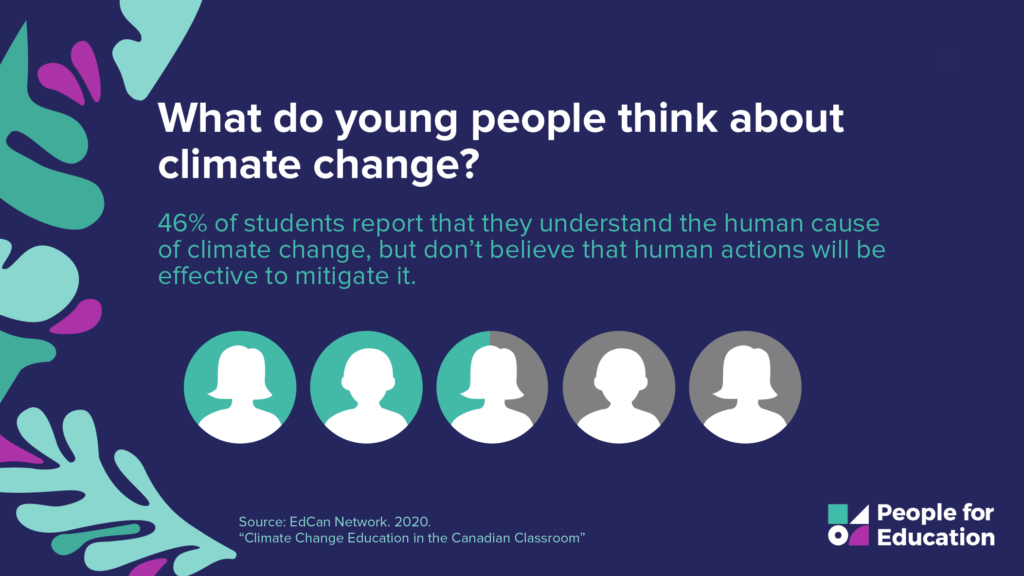Education and the 1.5 degree hypothesis
[To prevent worsening and potentially irreversible effects of climate change, the world’s average temperature should not exceed that of preindustrial times by more than 1.5 degrees Celsius.]
A study in 2020 showed that if only 16 percent of high school students in high- and middle-income countries were to receive climate change education, we could see a nearly 19 gigaton reduction of carbon dioxide by 2050.
Education is an essential component in the urgent global fight against climate change. It can not only encourage people to change their attitudes and mindsets but also help them to make informed choices and provide them with critical problem-solving skills. According to the UN, climate change education, can help to eliminate young people’s fears, and empower and motivate them to take action.
How climate literacy helps
Climate literacy is comprised of the knowledge, skills, and attitudes that enable individuals to counteract the global threat of climate change.
Through climate literacy, students can develop strong personal connections to climate solutions and learn about environmentally conscious practices. This further helps influence students’ daily behaviors and decision making beyond their school life, and not only makes them aware of problems related to climate change but also reduces their overall lifetime carbon footprint.
Climate education in schools can give young people a sense of personal agency and empowerment, and investing in education prepares the next generation to face climate change in a much more effective manner – ensuring they understand what is happening and why, how to tackle climate change issues, and how to work towards preventing further damage in the future.
Education has also shown to be vital in shaping beliefs about the costs and benefits of policies to reduce emissions and extend directly to consequential outcomes such as policy preferences and voting.
Education, youth and green skills
Education has the potential to increase the capacity of youth not only to adapt to the impacts of climate change, but also to contribute to solving climate issues, through knowledge mobilization and by building “green skills”. The acquisition of green skills helps to develop long-standing, pro-environmental behaviors in young people, which is especially important because youth can contribute to the ecological transition over a longer period of time, compared to people of other age groups. It can help individuals make greener decisions and engage in greener behaviors in a wide variety of contexts.  Young people need knowledge around the causes of climate change, but also a strong set of skills that will allow them to apply this knowledge in the real world, including skills such as problem-solving, critical thinking, teamwork, coping with uncertainty, empathy, and negotiation.
Young people need knowledge around the causes of climate change, but also a strong set of skills that will allow them to apply this knowledge in the real world, including skills such as problem-solving, critical thinking, teamwork, coping with uncertainty, empathy, and negotiation.
How are Canadian schools doing in terms of climate change education?
Despite the urgent need to improve and revamp climate change education in schools, the curriculum in many provinces continues to fall short. A recent study by the British Columbia Council for International Cooperation, found that climate change education currently appears to be added as an afterthought to curriculum, and even when added, it tends to focus on individual accountability towards climate change, rather than addressing the need for systemic change.
Canada’s provinces have taken some steps in progressing climate change education, but all of the evidence shows that more needs to be done.
The need for a reimagined and transformative education
From innovative sustainable technologies and renewable energy, to revolutions in transportation systems and industrial activity, young people must be equipped with skills and knowledge to shape a cleaner, greener, more climate resilient future.
UN Secretary-General António Guterres
The role of education should be to help us move from being simply concerned and having the facts to being empowered and mobilized to take action and to collectively work towards solutions to combat climate change. This calls for the need for a radically transformative education. One that includes basic knowledge of climate change and the development of sustainability competencies (like systems thinking and strategic thinking) and green skills to support pro-environmental behaviors and a green job-ready workforce capable of helping us transition to a greener economic model.
Ultimately, a transformative education must steer us towards a change in mindset – one that changes the way we see climate change and one that helps us be accountable; and enable the political transformations needed in the social and economic structures driving climate change.
Education, when working at its best, is one of the keys to reversing climate change.
There are key questions to be answered to ensure that Canadian schools are able to provide essential climate change education:
- How can we ensure that Canadian teachers have sufficient professional development opportunities to help them teach climate change?
- What needs to change so that our schools have the capacity (time, training, and resources) to support effective delivery of climate change education?
- Is the current curriculum content focused too narrowly on only the problem, rather than building understanding and students’ agency around systemic actions that could provide solutions?
- How can we build bridges between climate change experts and our school systems, to ensure that teaching and curriculum are informed by expert knowledge
